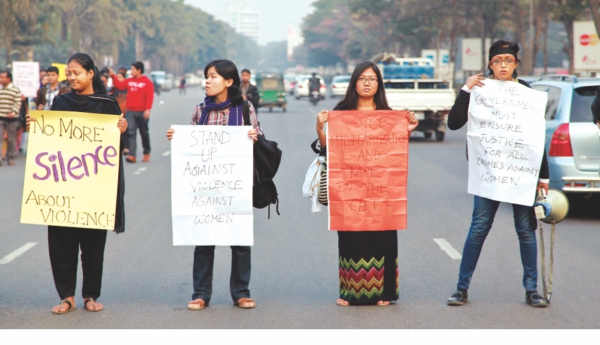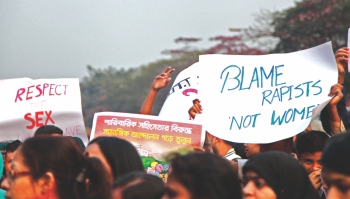| Spotlight

Breaking the Inner Barrier
Promiti Prova Chowdhury
Photos: Kazi Tahsin Agaz Apurbo
'And here goes another story on sexual harassment...'-- this is perhaps the very thought that crosses our minds these days as we unfold the newspaper. Human chains set up along the paths, stories coming from inner pages to the front and last pages, and then some follow ups again on the inner pages and then gone. Not a new thing, really.
But questions arise in minds and hearts gets wrenched to see young people deluded with the concept of sexual harassment and unknowingly, or sometimes intentionally, committing the heinous crime again and again, and more to add to the woe, abruptly shoving all the blames and responsibilities on, none other than, the victims, which, in the case, are the women.

Violence against women is a shame for the nation and is also a punishable crime.
According to a study done by Bangladesh National Women Lawyer's Association, 90 percent of the girls aged in between 10-18 are victims of sexual harassments. Now, what are the forms of sexual harassments? According to the guideline of High Court, any unwelcomed sexually determined behaviour is sexual harassment. That includes, indecent gesture, teasing through abusive language, stalking, making lewd comments, insult through letters, telephone calls, SMS, cartoon, writing on benches, tables, notice boards, walls of offices, factories, classrooms, washrooms having sexual implication, taking still or video photographs for the purpose of blackmailing and character assassination, preventing participation in sports, cultural, organisational and academic activities on the ground of sex or for the purpose of sexual harassment.
Exerting pressure or posing threats in case of refusal of love proposal, and attempt to establish sexual relation by intimidation, deception or false assurance also fall under the banner of 'sexual harassment.'
Naziba Hossain, a first year student of North South University was returning from a shopping mall the other day. She was on her way home, situated in the same locality, when some boys standing at the gate of the mall chanted, “Hey, I'll give you ten lakh taka if you have an affair with me.” When she angrily reacted, one of them pointed his finger towards her and said, “From where do you get so much courage?” Naziba says, “I was flabbergasted with this whole incident. The people around me were just staring and I had to walk away. When I returned home and shared this incident with my mother she told me not to overreact. The whole thing gave such a notion, as if I was at fault.” Naziba adds, “People say that a girl should wear decent clothes to ignore such incidents. I was wearing a shalwar kameez. This proves that it doesn't have to do anything with what you wear, it's the mindset of those who do it.”
'Women are objects'--such an attitude is not only confined within uneducated or roadside Romeos but it prevails amongst the educated male youths as well. Ikra Mahjabeen (not her real name), a student of Dhaka City College, says, “One day I was sitting at Shahbagh with a male classmate, when a girl dressed in a western outfit passed by. He chanted, 'the item is 9 on 10!' Luckily the girl did not hear. I asked him why he did that. But he didn't take my words seriously at all and started making jokes out of it.”

The sense of patriarchy is highly responsible for such crimes.
"In a patriarchal society like ours,
a boy child is given more importance in the family compared to the girls. The boy grasps a sense of superiority from a very early age from his family.
Schools and playgrounds are also the places where he spends most of his time, which advocate for male supremacy over females. Unfortunately, we do not have sufficient playgrounds nowadays.
In schools, there is no lesson that will teach the children how to
manage their sexual behaviour and attitude." |
|
So, where does this mindset come from? “Patriarchy,” says Maleka Begum, Professor, Women and Gender Studies at Central Women's College and University of Dhaka and Founder General Secretary, Bangladesh Mahila Parishad. “In a patriarchal society like ours, a boy child is given more importance in the family compared to the girls. The boy grasps a sense of superiority from a very early age from his family. Schools and playgrounds are also the places where he spends most of his time, which advocate for male supremacy over females. Unfortunately, we do not have sufficient playgrounds nowadays. In schools, there is no lesson that will teach the children how to manage their sexual behaviour and attitude. I have been in the national curriculum board twice and we proposed to introduce sex education in schools several times. If not as a separate subject, it can be put very subtly in subjects like social science and biology. But, because of the protest of one group this proposal was not taken on religious grounds.”

Alongside law, a change in mindset is necessary to stop sexual harassment.
Some research done by Stop Violence Networks run by ActionAid NGO, shows many more reasons behind this anarchy. “Our representatives working at different districts outside Dhaka have reported that pornography is shown at the tea stalls regularly. Starting from evening, these shows go on for hours which are regularly viewed by young boys of the locality. Such practices are injecting wrong conception among them regarding sexual pleasure. Rather a mutual thing, they are taking it as a mode of power play over girls. Instead of showing natural interest to opposite sex, they are taking an aggressive approach. From stating sexually coloured remarks to raping, every form of harassment is born from this attitude,” says Tahmina Huq, Manager, Women and Gender Equity Sector, ActionAid.
“However, our networks are running campaigns like 'Violence Free School Environment' especially for the safety of young female students. Our officers orient students (both male and female), parents and teachers and make a link among them to ensure a violence free environment. It encourages young girls to state such problems to their guardians without any hesitation. Also, they make a watch group that can take immediate action if any girl is harassed while on her way to school.”
To add to that, Huq says, “When the victim or her family goes to file an FIR, even the police asks questions like, 'why did he (the perpetrator) choose you,' 'why did you have to get out in the evening' etc. and if the girl's family is economically underprivileged then the situation is even worse. Our representatives stay with them to avoid such harassments.”
| |
 |
| |
Sexual harassment—not a shame for the victim, but a crime done by the perpetrator! |
In 2008, when a teacher at Jahangirnagar University harassed four female students, the university syndicate set him free of allegations and instead, expelled the four students. In 2009 when those four students filed a writ petition to Ain O Shalish Kendra, the just born guideline regarding sexual harassment from High Court helped them out with the matter and the perpetrator got his punishment. That time, it was the law that helped. Now, we have the law but, the biggest impediment is our mindset. If a person steals something from a house then he is the one who gets bashed up. The owner of the house is not accused! Then why does our society still put some sort of responsibility on the girls for being harassed? Sexual harassment—it is not a shame for the victim, but a crime done by the perpetrator!
|
